

So it occurred to me that I've mentioned a lot of good books over the course of my classes in the past several years. I love to read, and think that some of these would benefit you, or just entertain, if you have a little spare time to invest.
 ) indicates that the listed book is available free through the Sherrod Library's O'Reilley Online collection (you have to log in to the library site to access these)
) indicates that the listed book is available free through the Sherrod Library's O'Reilley Online collection (you have to log in to the library site to access these)
This list is intended to be a living document. I plan to add more listings to it as they occur to me. If you know of a good, computing-oriented book - fiction or non-fiction - feel free to drop me a line!



Bill is an IT manager at Parts Unlimited. It's Tuesday morning and on his drive into the office, Bill gets a call from the CEO.
The company's new IT initiative, code named Phoenix Project, is critical to the future of Parts Unlimited, but the project is massively over budget and very late. The CEO wants Bill to report directly to him and fix the mess in ninety days or else Bill's entire department will be outsourced.
With the help of a prospective board member and his mysterious philosophy of The Three Ways, Bill starts to see that IT work has more in common with manufacturing plant work than he ever imagined. With the clock ticking, Bill must organize work flow streamline interdepartmental communications, and effectively serve the other business functions at Parts Unlimited.
In a fast-paced and entertaining style, three luminaries of the DevOps movement deliver a story that anyone who works in IT will recognize. Readers will not only learn how to improve their own IT organizations, they'll never view IT the same way again.
I have this as required reading for my CSCI 4417 class. It provides a realistic look in to the day-to-day workings of a modern IT department as well as illustrating the principles of DevOps. I've heard that many companies also require new hires to read it as well


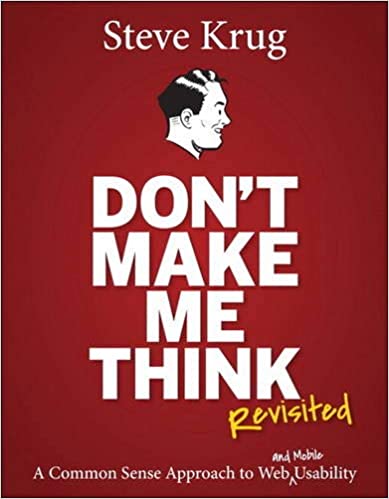
Since Don’t Make Me Think was first published in 2000, hundreds of thousands of Web designers and developers have relied on usability guru Steve Krug’s guide to help them understand the principles of intuitive navigation and information design. Witty, commonsensical, and eminently practical, it’s one of the best-loved and most recommended books on the subject.
Now Steve returns with fresh perspective to reexamine the principles that made Don’t Make Me Think a classic–with updated examples and a new chapter on mobile usability. And it’s still short, profusely illustrated…and best of all–fun to read.
If you’ve read it before, you’ll rediscover what made Don’t Make Me Think so essential to Web designers and developers around the world. If you’ve never read it, you’ll see why so many people have said it should be required reading for anyone working on Web sites.
This is a small book, but offers a lot of insight into the notion of usability and design for the web. There are a lot of no-nonsense suggestions that can help make the principles we cover in CSCI 1210 and CSCI 1720 easier to understand


Your cell phone provider tracks your location and knows who’s with you. Your online and in-store purchasing patterns are recorded, and reveal if you're unemployed, sick, or pregnant. Your e-mails and texts expose your intimate and casual friends. Google knows what you’re thinking because it saves your private searches. Facebook can determine your sexual orientation without you ever mentioning it.
The powers that surveil us do more than simply store this information. Corporations use surveillance to manipulate not only the news articles and advertisements we each see, but also the prices we’re offered. Governments use surveillance to discriminate, censor, chill free speech, and put people in danger worldwide. And both sides share this information with each other or, even worse, lose it to cybercriminals in huge data breaches.
Much of this is voluntary: we cooperate with corporate surveillance because it promises us convenience, and we submit to government surveillance because it promises us protection. The result is a mass surveillance society of our own making. But have we given up more than we’ve gained? In Data and Goliath, security expert Bruce Schneier offers another path, one that values both security and privacy. He brings his bestseller up-to-date with a new preface covering the latest developments, and then shows us exactly what we can do to reform government surveillance programs, shake up surveillance-based business models, and protect our individual privacy. You'll never look at your phone, your computer, your credit cards, or even your car in the same way again.
This is a really fascinating, and somewhat scary exploration of how our complacency with 'free' software can impact our privacy. Schneier is an authority on privacy in the digital world

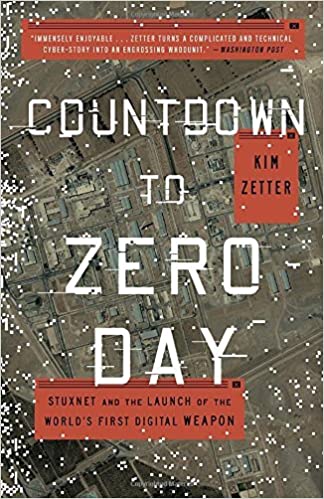
In January 2010, inspectors with the International Atomic Energy Agency noticed that centrifuges at a uranium enrichment plant in Iran were failing and being replaced at an unprecedented rate. The cause of their failure was a complete mystery.
Five months later, a seemingly unrelated event occurred. A computer security firm in Belarus was called in to troubleshoot some computers in Iran that were caught in a reboot loop—crashing and rebooting repeatedly. At first, technicians with the firm believed the malicious code they found on the machines was a simple, routine piece of malware. But as they and other experts around the world investigated, they discovered a virus of unparalleled complexity and mysterious provenance and intent. They had, they soon learned, stumbled upon the world’s first digital weapon.
Stuxnet, as it came to be known, was unlike any other virus or worm built before: It was the first attack that reached beyond the computers it targeted to physically destroy the equipment those computers controlled. It was an ingenious attack, jointly engineered by the United States and Israel, that worked exactly as planned, until the rebooting machines gave it all away.
This book is provides a detailed, heavily annotated expose of Stuxnet and the weaponization of code

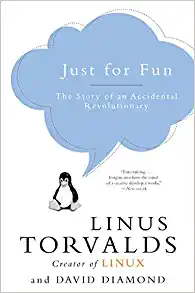
Once upon a time Linus Torvalds was a skinny unknown, just another nerdy Helsinki techie who had been fooling around with computers since childhood. Then he wrote a groundbreaking operating system and distributed it via the Internet -- for free. Today Torvalds is an international folk hero. And his creation LINUX is used by over 12 million people as well as by companies such as IBM.
Now, in a narrative that zips along with the speed of e-mail, Torvalds gives a history of his renegade software while candidly revealing the quirky mind of a genius. The result is an engrossing portrayal of a man with a revolutionary vision, who challenges our values and may change our world.
A little dated, I was slow to notice, but this is the personal account of one of computing's 'bad boys' and arguably most talented programmers, Linus Torvalds. In it, he provides (from his point of view) a history of the development of the Linux operating system

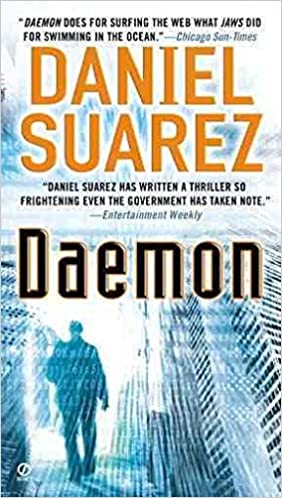
Technology controls almost everything in our modern-day world, from remote entry on our cars to access to our homes, from the flight controls of our airplanes to the movements of the entire world economy. Thousands of autonomous computer programs, or daemons, make our networked world possible, running constantly in the background of our lives, trafficking e-mail, transferring money, and monitoring power grids. For the most part, daemons are benign, but the same can't always be said for the people who design them.
Matthew Sobol was a legendary computer game designer—the architect behind half-a-dozen popular online games. His premature death depressed both gamers and his company's stock price. But Sobol's fans aren't the only ones to note his passing. When his obituary is posted online, a previously dormant daemon activates, initiating a chain of events intended to unravel the fabric of our hyper-efficient, interconnected world. With Sobol's secrets buried along with him, and as new layers of his daemon are unleashed at every turn, it's up to an unlikely alliance to decipher his intricate plans and wrest the world from the grasp of a nameless, faceless enemy—or learn to live in a society in which we are no longer in control. . . .
Computer technology expert Daniel Suarez blends haunting high-tech realism with gripping suspense in an authentic, complex thriller in the tradition of Michael Crichton, Neal Stephenson, and William Gibson.
I read this a while back and really enjoyed it. The author is an IT pro who decided to write some speculative fiction, which turned out pretty good

Cryptonomicon zooms all over the world, careening conspiratorially back and forth between two time periods—World War II and the present. Our 1940s heroes are the brilliant mathematician Lawrence Waterhouse, crypt analyst extraordinaire, and gung-ho, morphine-addicted marine Bobby Shaftoe. They're part of Detachment 2702, an Allied group trying to break Axis communication codes while simultaneously preventing the enemy from figuring out that their codes have been broken. Their job boils down to layer upon layer of deception. Dr. Alan Turing is also a member of 2702, and he explains the unit's strange workings to Waterhouse. "When we want to sink a convoy, we send out an observation plane first... Of course, to observe is not its real duty—we already know exactly where the convoy is. Its real duty is to be observed... Then, when we come round and sink them, the Germans will not find it suspicious.
All of this secrecy resonates in the present-day story line, in which the grandchildren of the WWII heroes—inimitable programming geek Randy Waterhouse and the lovely and powerful Amy Shaftoe—team up to help create an offshore data haven in Southeast Asia and maybe uncover some gold once destined for Nazi coffers. To top off the paranoiac tone of the book, the mysterious Enoch Root, key member of Detachment 2702 and the Societas Eruditorum, pops up with an unbreakable encryption scheme left over from WWII to befuddle the 1990s protagonists with conspiratorial ties.
A gy-nor-mous book, but very interesting. Historical fiction at its best. Stephenson provides a story-based description of a variety of topics, including encryption, the history of encryption (specifically World War II-era), and transoceanic cable-laying

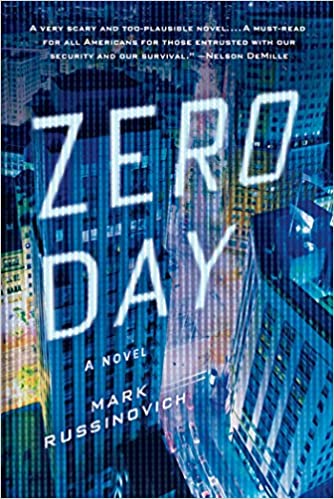
Over the Atlantic, an airliner's controls suddenly stop reacting. In Japan, an oil tanker runs aground when its navigational system fails. And in America, a nuclear power plant nearly becomes the next Chernobyl.
At first, these computer failures seem unrelated. But Jeff Aiken, a former government analyst who saw the mistakes made before 9/11, fears that there may be a more serious attack coming. And he soon realizes that there isn't much time if he hopes to stop an international disaster.
It's been a while since I read the Jeff Aiken books (see below), but they're all really good. If you aren't familiar with the author's name, well, I like to say that he's the guy Bill Gates goes to with his questions about Windows. No one knows more about the inner workings of the Windows OS than Russinovich

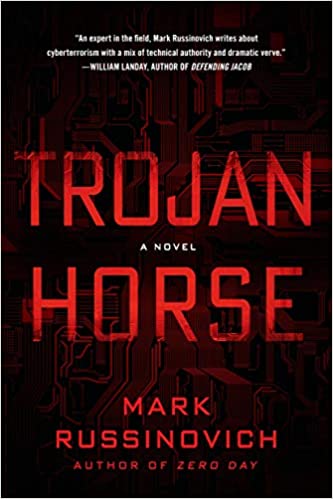
It's two years after the Zero Day attacks, and cyber-security analyst Jeff Aiken is reaping the rewards for crippling Al-Qaida's assault on the computer infrastructure of the Western world. His company is flourishing, and his relationship with former government agent Daryl Haugen has intensified since she became a part of his team.
But the West is under its greatest threat yet. A revolutionary, invisible trojan that alters data without leaving a trace---more sophisticated than any virus seen before---has been identified, roiling international politics. Jeff and Daryl are summoned to root it out and discover its source. As the trojan penetrates Western intelligence, and the terrifying truth about its creator is revealed, Jeff and Daryl find themselves in a desperate race to reverse it as the fate of both East and West hangs in the balance.
A thrilling suspense story and a sober warning from one of the world's leading experts on cyber-security, Trojan Horse exposes the already widespread use of international cyber-espionage as a powerful and dangerous weapon, and the lengths to which one man will go to stop it.
(see above)


Cyber security expert Jeff Aiken knows that no computer system is completely secure. When he's called to investigate a possible breach at the New York Stock Exchange, he discovers not only that their system has been infiltrated but that someone on the inside knows. Yet for some reason, they have allowed the hackers to steal millions of dollars from accounts without trying to stop the theft.
When Jeff uncovers the crime, the NYSE suddenly turns on him. Accused of grand larceny, he must find and expose the criminals behind the theft, not just to prove his innocence but to stop a multibillion-dollar heist that could upend the U.S. economy. Unwilling to heed Jeff's warnings, the NYSE plans to continue with a major IPO using a new, untested system, one that might be susceptible both to hackers and to ruthless high-frequency traders willing to take any risk to turn a profit.
Now Jeff Aiken must unearth the truth on his own, following the thread to the back alleys of Rio de Janeiro to take on one of the world's most ruthless cartels.
(see above)


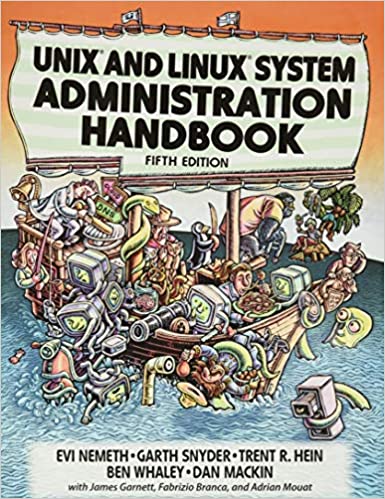
"As an author, editor, and publisher, I never paid much attention to the competition-except in a few cases. This is one of those cases. The UNIX System Administration Handbook is one of the few books we ever measured ourselves against." -From the Foreword by Tim O'Reilly, founder of O'Reilly Media "This book is fun and functional as a desktop reference. If you use UNIX and Linux systems, you need this book in your short-reach library. It covers a bit of the systems' history but doesn't bloviate. It's just straightfoward information delivered in colorful and memorable fashion." -Jason A. Nunnelley
"This is a comprehensive guide to the care and feeding of UNIX and Linux systems. The authors present the facts along with seasoned advice and real-world examples. Their perspective on the variations among systems is valuable for anyone who runs a heterogeneous computing facility." -Pat Parseghian
The twentieth anniversary edition of the world's best-selling UNIX system administration book has been made even better by adding coverage of the leading Linux distributions: Ubuntu, openSUSE, and RHEL. This book approaches system administration in a practical way and is an invaluable reference for both new administrators and experienced professionals. It details best practices for every facet of system administration, including storage management, network design and administration, email, web hosting, scripting, software configuration management, performance analysis, Windows interoperability, virtualization, DNS, security, management of IT service organizations, and much more. UNIX® and Linux® System Administration Handbook, Fourth Edition, reflects the current versions of these operating systems:
Ubuntu® Linux
openSUSE® Linux
Red Hat(R) Enterprise Linux®
Oracle America® Solaris™ (formerly Sun Solaris)
HP HP-UX®
IBM AIX® (less)
This is the definitive reference for *nix sysadmins. The writing is entertaining and informative. I highly recommend having (the most recent edition) on your bookshelf as you venture out into the world


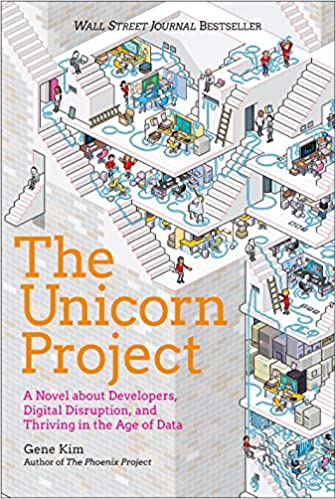
This highly anticipated follow-up to the bestselling title The Phoenix Project takes another look at Parts Unlimited, this time from the perspective of software development.
In The Phoenix Project, Bill, an IT manager at Parts Unlimited, is tasked with a project critical to the future of the business, code named Phoenix Project. But the project is massively over budget and behind schedule. The CEO demands Bill fix the mess in ninety days or else Bill's entire department will be outsourced.
In The Unicorn Project, we follow Maxine, a senior lead developer and architect, as she is exiled to the Phoenix Project, to the horror of her friends and colleagues, as punishment for contributing to a payroll outage. She tries to survive in what feels like a heartless and uncaring bureaucracy and to work within a system where no one can get anything done without endless committees, paperwork, and approvals.
One day, she is approached by a ragtag bunch of misfits who say they want to overthrow the existing order, to liberate developers, to bring joy back to technology work, and to enable the business to win in a time of digital disruption. To her surprise, she finds herself drawn ever further into this movement, eventually becoming one of the leaders of the Rebellion, which puts her in the crosshairs of some familiar and very dangerous enemies.
The Age of Software is here, and another mass extinction event looms--this is a story about "red shirt" developers and business leaders working together, racing against time to innovate, survive, and thrive in a time of unprecedented uncertainty...and opportunity.
Like The Phoenix Project, I thought the book started out a little slow. But, by the end, I couldn't put it down. Some familiar figures from TPP move in and out of the story, but Wes and Brent are there throughout. There were a few inconsistencies, which Gene Kim points out in the foreword, due to the passage of time between the publication of the two books. But an alltogether worthwhile and enjoyable read.
Where TPP focused on The Three Ways, TUP introduces the reader to the Five Ideals


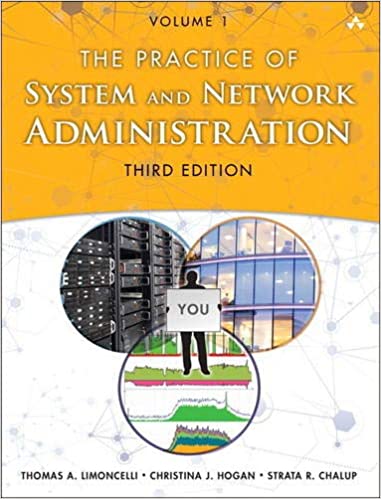
With 28 new chapters, the third edition of The Practice of System and Network Administration innovates yet again! Revised with thousands of updates and clarifications based on reader feedback, this new edition also incorporates DevOps strategies even for non-DevOps environments.
Whether you use Linux, Unix, or Windows, this new edition describes the essential practices previously handed down only from mentor to protégé. This wonderfully lucid, often funny cornucopia of information introduces beginners to advanced frameworks valuable for their entire career, yet is structured to help even experts through difficult projects.
Other books tell you what commands to type. This book teaches you the cross-platform strategies that are timeless! No vague “management speak” or empty platitudes. This comprehensive guide provides real solutions that prevent these problems and more!
This is a book I highly recommend to my Intro to System Administration students. The authors have decades of IT experience and present their material in an easy to read, no nonsense manner. You can read it cover to cover, or cherry-pick the topics that are of interest to you